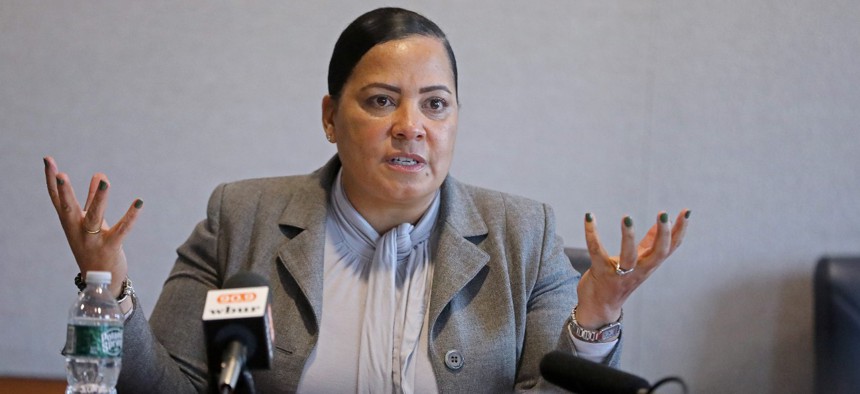
U.S. Attorney Rachael Rollins, shown here at a Dec. 19, 2022 press conference, resigned her position due to allegations of ethics and Hatch Act violations. Pat Greenhouse/The Boston Globe via Getty Images
A U.S. Attorney Quits After 'Most Egregious' Hatch Act and Ethical Violation Reports
Leaking non-public information to media outlets to influence an election and using her position to gain Celtics tickets were among the transgressions found by investigators.
The Massachusetts U.S. attorney who will be resigning on Friday following damning reports of alleged ethical breaches, including serious Hatch Act violations, will take questions at a later point, her attorney said. He also contended that many of the violations reported “amount to minor process fouls,” but investigators and lawmakers used much stronger language, calling the violations “egregious” and an “ethical nightmare.”
The Justice Department inspector general and Office of Special Counsel both issued reports on Wednesday about misconduct allegations against U.S. Attorney Rachael Rollins, whom President Biden tapped for the role in July 2021. OSC found that Rollins’ violations of the Hatch Act were among the “most egregious transgressions of the act that OSC has ever investigated.” The IG report included the violations OSC investigated and other instances of misconduct.
The lawyer representing Rollins downplayed the allegations, however. “I think the OIG report needs to be put in context,” said Michael Bromwich, who previously served as Justice Department IG, in a statement. “The central truth is that she moved from being an elected official with virtually no restrictions on her activities to the highly-regulated environment of the U.S Attorney’s Office. Most of the allegations amount to minor process fouls.”
Additionally, “though Ms. Rollins could have raised many facts and arguments in connection with these issues, she had no interest in litigating them any further,” Bromwich continued. “She believed the better course was to step down and end the matter before it overwhelmed her office and DOJ.”
On Tuesday, ahead of the report’s release, Bromwich said in a statement that Rollins’ important work will continue, but that she “understands that her presence has become a distraction.” Also, following her resignation on Friday and the dust settling, “Rachael will make herself available to answer questions.” The Associated Press first reported this.
OSC found that Rollins violated the Hatch Act by attempting to interfere with the 2020 election for district attorney of Suffolk County, Massachusetts by leaking non-public information to media outlets that a candidate she opposed was going to face a possible Justice Department investigation. She also was said to have violated the law by attending a Democratic National Committee fundraiser while on duty, in her official capacity and using a government-owned car, despite repeated warnings not to.
The Justice IG found that overall Rollins’ conduct “violated federal regulations, numerous DOJ policies, her ethics agreement and applicable law, and fell far short of the standards of professionalism and judgment that the department should expect of any employee, much less a U.S. attorney.”
In one instance, the IG found that Rollins violated the standards of ethical conduct for executive branch employees by soliciting 30 Celtics tickets for youth basketball players by using a connection with her official role as U.S. attorney; accepting two tickets for herself due to her official position; and using an office program specialist's time improperly to coordinate the event after she was told that she couldn’t use office resources for her.
The report also said that during an interview with the IG office in December, Rollins made false statements under oath about the leak situation. A footnote notes that the IG office referred the allegation to the Justice Department and in early January the department informed them they declined to prosecute.
'A Walking, Talking Ethical Nightmare'
Sen. Dick Durbin, D-Ill., chair of the Senate Judiciary Committee and Senate majority whip, said in a statement on Wednesday that he was “deeply” concerned about Rollins’ conduct, as outlined in the reports, and supported her resignation. Expanding on that during a hearing on Thursday, Durbin said, “Any time a public official falls short of their ethical obligations, whether it's in the executive, legislative or judicial branch of government, there must be consequences.”
Sen. Lindsey Graham, R-S.C., ranking member of the Senate Judiciary Committee, tweeted on Thursday he was glad to see Durbin support Rollins' resignation and encouraged other Democrats to follow suit. He also re-surfaced criticism he had of Rollins during her confirmation process.
As The Washington Post reported in October 2021, Republicans put up roadblocks to Rollins’ nomination, not used in nearly 30 years, due to her support for criminal justice reforms.
Rep. James Comer, R-Ky., chairman of the House Oversight and Accountability Committee, said on Thursday that Rollins “is a walking, talking ethical nightmare,” and cast blame on the Biden White House.
“The OIG and OSC findings against U.S. Attorney Rollins, if true, may undermine the American people’s trust in our justice system,” said Steve Wasserman, president of the National Association of Assistant U.S. Attorneys. “Fortunately, the findings also demonstrate the strong system in place to identify, investigate, and hold accountable those who potentially abuse their public position,” as well as “highlight the value of career leaders within the office who refused to participate in partisan activities and took the proper steps to seek outside advice and review.”
The White House deferred to the Justice Department for comment, and the Justice Department did not respond by the time of this article’s publication.







